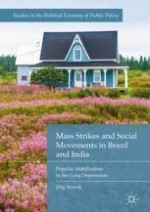2019 | OriginalPaper | Chapter
2. A New Theory of Strikes: Moving Beyond Eurocentrism
Author : Jörg Nowak
Published in: Mass Strikes and Social Movements in Brazil and India
Publisher: Springer International Publishing
Activate our intelligent search to find suitable subject content or patents.
Select sections of text to find matching patents with Artificial Intelligence. powered by
Select sections of text to find additional relevant content using AI-assisted search. powered by
